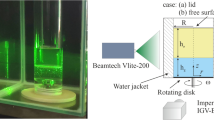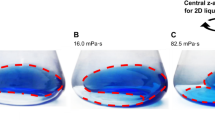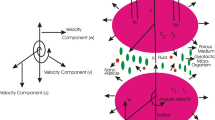Abstract
THE advantages of aerating liquid cultures of bacteria to enhance the yield are well known. The use of sparger aeration techniques on a small scale, is subject to certain disadvantages due to difficulties in sterilizing the air supply and controlling the frothing of the medium—particularly when it contains serum.
This is a preview of subscription content, access via your institution
Access options
Subscribe to this journal
Receive 51 print issues and online access
$199.00 per year
only $3.90 per issue
Buy this article
- Purchase on Springer Link
- Instant access to full article PDF
Prices may be subject to local taxes which are calculated during checkout
Similar content being viewed by others
References
Chain, E. B., Paladino, D., Callow, D. S., Ugolini, F., and Van Der Sluis, J., W.H.O. Mon. Series, No. 10 (1952).
Bain, R. V., Brit. Vet. J., 110, 519 (1954).
Newing, C. R., Brit. Vet. J., 111, 378 (1955).
Author information
Authors and Affiliations
Rights and permissions
About this article
Cite this article
NEWING, C., MACLEOD, A. Magnetically Induced Vortex for Small-scale Aerated Culture Studies. Nature 177, 939–940 (1956). https://doi.org/10.1038/177939b0
Issue Date:
DOI: https://doi.org/10.1038/177939b0
This article is cited by
Comments
By submitting a comment you agree to abide by our Terms and Community Guidelines. If you find something abusive or that does not comply with our terms or guidelines please flag it as inappropriate.



